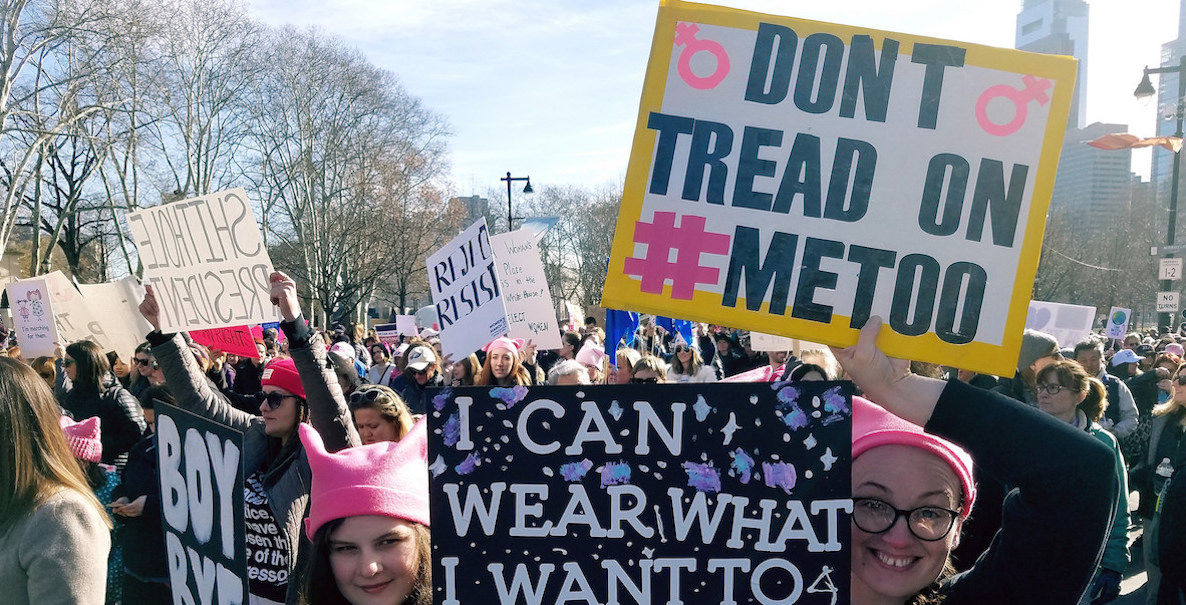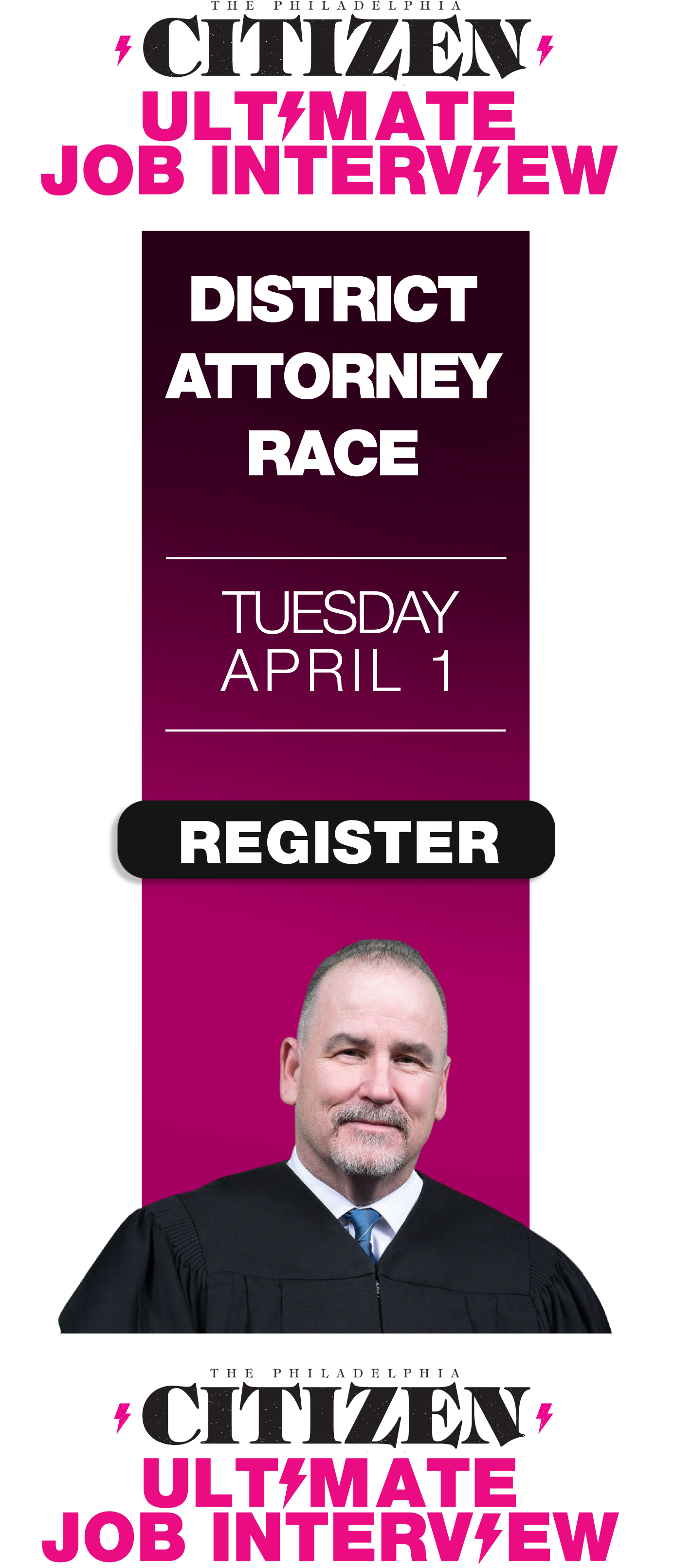For a quick snapshot of how the #MeToo movement has fared in Pennsylvania, one need only look at the national embarrassment that is Delaware County Rep. Nick Miccarelli. Miccarelli, you might recall from things like this front page New York Times article, is the former rising star who was accused of raping a Harrisburg political consultant, of harassment and assault by a fellow Republican legislator he dated for several months, and of retaliation when they came forward.
Be Part of the Solution
Become a Citizen member.A House investigation in March found the claims to be credible and “extremely serious,” and referred the matter to Harrisburg’s District Attorney. House GOP leaders publicly called on Miccarelli to resign, as so many other lawmakers in similar circumstances across the country have. But he has steadfastly refused, denying the accusations, and sending his spokesman Frank Keel out to bash the women, as in an Inquirer story in which he called them “vengeful girlfriends.”
Meanwhile, taxpayers are footing the bill for a security guard to tail his colleague and ex-girlfriend Rep. Tarah Toohil, who has a court order of protection against Miccarelli. And after their initial show of disappointment, House leaders have remained steadfastly silent on the issue. They have not insisted on Miccarelli’s departure, or voted to expel him as has happened in Arizona, Tennessee and Colorado (though he was stripped of his committee posts). Instead, Miccarelli, who is not seeking reelection, plans to serve out his term, leaving in November with a taxpayer-funded lifetime pension and healthcare benefits for his family.
“These are pretty basic ideas,” Fromson says. “People should just be entitled to not be sexually harassed at work, and be entitled to ask someone to stop it if it happens.
At least we know about that outlay of funds. It was only in January, after a joint Inquirer/Daily News-Pittsburgh Post-Gazette investigation, that we learned of the $3.2 million taxpayers have paid out to settle harassment claims in state government over the last eight years—including $250,000 House Democrats paid to resolve a complaint against Rep. Thomas Caltagirone.
No wonder Delaware County Rep. Leanne Krueger-Braneky—who spent years in the private business sector—has called the state legislature “the most misogynistic place I’ve ever worked.”
That’s why Krueger-Braneky in January introduced her #MeToo bill with several co-sponsors, which would increase protection and recourse for people who work in the state legislature, as well as transparency about how our elected officials and their staff are behaving to each other—including payments made to settle cases. It would seem an easy place to start down the road of legislating better protections for women in jobs across the state.
“The way many legislators have put it in states and Congress is that they felt like they needed to get their own house in order before they could pass laws to get other employers in line,” says Maya Raghu, director of Workplace Equality and Senior Counsel for the National Women’s Law Center. “They needed to be able to say that they are bound by these rules.”
That, of course, hasn’t happened in Pennsylvania. In fact, not only hasn’t Krueger-Braneky’s bill been passed, it has not even come up for a hearing in the Labor & Industry Committee, of which she is a member. (So far, the only official airing of the legislation was during a half-day hearing on the issue of sexual harassment in April, when anyone who sponsored a bill could talk about it for three minutes.) Nor have more than a dozen other bills addressing the issue of workplace sexual harassment even come out of committees across the legislature.
Instead, the only concrete way in which Harrisburg officials acknowledged the swirl of harassment in their midst was to vote on a Republican-sponsored resolution in June to establish a task force to study the issue of sexual harassment. “Every woman in Pennsylvania knows it’s clear that there’s a problem with sexual harassment and something needs to be done,” says Krueger-Braneky. “A task force is not going to be able to tell us anything more than we already know. It’s a step, not a solution.”
In exchange for Democratic support for the task force, Krueger-Braneky says House Labor & Industry Committee Chairman Rob Kauffman promised her a hearing on the nine bills before him in September. (They all have Democrats as their lead sponsors.) That leaves time for elected officials to pass one or more of the proposals by the end of the session on November 30—if they are so inclined. That is a big if.
In the meantime, this has led us to wonder why any of this is necessary at all. Here, an attempt, to answer that.
Aren’t employees already protected by existing sexual harassment laws?
Yes, and no. The federal Civil Rights Act of 1964 included Title VII, which protects employees from sex discrimination in many situations. But it has its limits: The law is only for companies that have more than 15 employees, for example; it also excludes interns, volunteers and independent contractors, which encompass a growing swath of the American workforce and some of the most vulnerable people, like domestic workers and farm laborers. “The law is clearly a product of its historic context and who’s in power and who’s not,” says Raghu. “Just look at who’s been carved out of all these protections. That tells you a lot.”
Federal law allows states and local jurisdictions to enact sexual harassment rules that provide more protections—never less—than Title VII, and the Pennsylvania Human Relations Act has done that: It covers workers in companies with as few as four employees, and some types of independent contractors, if they are professionally licensed—like nurses or teachers; that still leaves out a sizable number of working women, including those at small startups with all contract employees, housecleaners, interns, farm workers, smaller retailers and the like. “There is no reason that someone who works for a one employee company shouldn’t have a remedy,” says Terry Fromson, legal director of the Women’s Law Project in Philadelphia. “They are all vulnerable individuals in that regard.”
The good news: Philadelphia—along with Pittsburgh—has the strongest anti-harassment protections in the state, thanks to updates to the law over the last several years. The bad news: 40 percent of working Philadelphians have jobs outside the city.
In addition to Krueger-Braneky’s bill to regulate legislative employees, many of the laws introduced in Harrisburg this year seek to close those gaps in particular, as well as to extend the amount of time women can report harassment from 180 days to two years, mandate written policies and procedures to prevent and address harassment, post explanations of harassment where employees can see them, and require training.
“These are pretty basic ideas,” Fromson says. “People should just be entitled to not be sexually harassed at work, and be entitled to ask someone to stop it if it happens. Otherwise, they’re left with no real choice: You stay and deal with harassment, or leave and your ability to fare for your family is undermined, and your future employment is undermined.”
What about Philadelphia law?
Good news there: Philadelphia—along with Pittsburgh—has the strongest anti-harassment protections in the state, thanks to updates to the law over the last several years. The City’s Commission on Human Relations will investigate complaints from any type of employee in the city, regardless of the size of the employer, as well as claims of harassment or discrimination from unions. It also covers a wide range of possible employment discriminations, including sexual orientation, gender identity, race, disability and pregnancy—areas not always covered by federal or state statutes.
In the workplaceKnow your rights
The bad news: 40 percent of working Philadelphians—some 211,000 people—have jobs outside the city. That means they are subject to their employers’ local ordinances, some of which are stronger than the statewide law, but others that are not. Knowing what is and isn’t covered can be hard even for lawyers like Fromson; for employees, it’s often impossible to know their rights. “Geography becomes complicated,” says Fromson. “But someone shouldn’t have to be in a specific zip code to get a particular remedy.”
Why isn’t the Pennsylvania legislature doing more to be like Philadelphia?
It would appear that party politics is doing its thing. The workplace harassment bills have all been introduced by Democrats, the minority party, though most have a bipartisan list of co-sponsors. While Rep. Kauffman has not boasted of never allowing a Democratic-sponsored bill to come to the floor—as his fellow Republican, House State Government Committee Chairman Daryl Metcalfe, has—it seems telling that only the task force resolution introduced by Republicans got a hearing and an actual vote in his committee.
Rep. Sheryl Delozier, one of the Republican women who sponsored the task force resolutions, told The Inquirer during the June vote that the study would give legislators more specifics of how many instance of sexual harassment are happening in which government departments, so they can better determine how to act—something particularly important for her Republican colleagues who fear there could be “unintended consequences” from the bills being proposed. She also insisted it was not a stalling tactic, and it’s true that any of the bills could still come up for a vote while the 18-month study is being conducted.
Sexual harassment in Pennsylvania or anywhere else is not going to go away with legislation alone. It requires not just legal and political change, but also a culture shift in the way companies engage with and oversee their employees.
Krueger-Braneky acknowledges that the issue is complicated, and says she is willing to consider amendments to her bill as part of the legislative process—standard procedure—if given the chance. Other lawmakers have said the same thing. But Krueger-Braneky also notes that she spent months talking to stakeholders here and around the country; went through seven drafts before introducing her bill; and modeled it on a similar piece of legislation in the U.S. House that passed with overwhelming bipartisan support. (The Senate’s version was less strong, and Raghu says informal negotiations are ongoing.)
“I spent a lot of time looking at this issue already, and went through a pretty exhaustive process,” she says. “Meanwhile, women have not stopped being harassed in the state legislature by any means. We just haven’t decided to take action on this yet.”
How have other states fared on this issue?
There isn’t one state that legal experts can point to as a gold standard for workplace protections, though many—like California—are far ahead of the curve in several areas, like protecting independent contractors. According to Raghu, more than 100 bills were introduced in state capitols this session, and around 10 states passed some form of legislation addressing workplace harassment. Some of those were incredibly low-hanging fruit: Tennessee legislators, for example, finally passed a law this year prohibiting companies from forcing applicants to sign a sexual harassment non-disclosure agreement as a condition of employment.
Washington and New York, on the other hand, passed packages of laws addressing this issue that include a range of protections, including for victims of domestic violence. In New York, the new law requires all public and private employers to conduct sexual harassment training and adopt written prevention policies; New York City’s law requires annual trainings for companies over 15 employees.
While Rep. Kauffman has not boasted of never allowing a Democratic-sponsored bill to come to the floor—as his fellow Republican, House State Government Committee Chairman Daryl Metcalfe, has—it seems telling that only the task force resolution introduced by Republicans got a hearing and an actual vote in his committee.
In other states, often those rocked by legislative harassment scandals, it has also not been a partisan issue. Both Democrats and Republicans have been ousted for bad behavior, and have responded with reforms. Rhagu notes that legislatures around the country have held hearings that allow for different stakeholders to have their say—workers, advocates and employers. “We can’t forget the importance of employer and corporate leadership on this issue,” Rhagu says. “There may be a lot of leaders who don’t know how, or don’t have think they can afford, to address this. But legislators are hearing from employers who want to do the right thing, who are interested in not just responding, but also preventing harassment.”
What can be done?
Sexual harassment in Pennsylvania or anywhere else is not going to go away with legislation alone. It requires not just legal and political change, but also a culture shift in the way companies engage with and oversee their employees. This is not a bottom line issue in the way that raising the minimum wage or giving workers set hours is; training costs a minimal amount of money, and while companies are on the hook for damages if they have to pay a claim, that is only if employees are being harassed. The best way to save that money? Ensure policies, training, and a culture that will not tolerate harassment—and just don’t do it. The Women’s Law Center has put together a set of tools to help employers prevent harassment.
Stories by Roxanne Patel ShepelavyRead More
Rhagu says people who come forward to publicly talk about their experiences—as a woman, a man, an LGBTQ person, a person of color—help to shift the conversation towards solving, rather than pushing down the road, the problem of harassment. “I assume all the legislators know this is a problem,” she says. “But it’s one thing to know in the abstract, another to have a person in front of you who is a mother, working in a low wage industry, who has to put up with harassment in order to survive.”
In Pennsylvania, there is also the other great imbalance: The vast majority—81 percent—of the elected officials in the state are men, including most of the committee chairs, and all of the leadership. They are not, as Krueger-Braneky says, “clamoring to have this brought forward.” So, we can work to elect more women who have women’s concerns in mind. In the meantime, we can insist our elected officials who are there do what they’re being paid for: Actually act on proposed legislation.
And we can lend our support to the Womens Law Center’s Times Up Legal Defense Fund, which launched this year to offer free representation for women across the country who are being harassed—particularly low wage workers, or those whose state law makes it hard to win a case. Well over 3,000 people have come forward since January, who are either seeking information or are ready to go forward, and the fund will help cover their legal costs.
Photo: Rob Kall via Flickr






